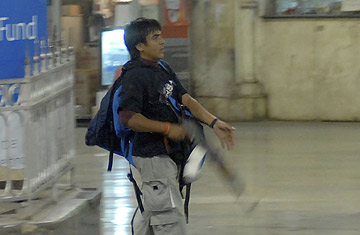
A gunman identified by police as Ajmal Qasab walks through the Chatrapathi Sivaji Terminal railway station in Mumbai on Nov. 26, 2008
Over three harrowing days in late November 2008, Mohammad Amir Ajmal Qasab, a 21-year-old Pakistani, and nine other gunmen stormed various locations in the Indian financial hub of Mumbai, detonating bombs, hurling grenades and killing more than 170 people. After being captured, Qasab — the only gunman not to be killed by Indian security forces — admitted to being a member of Lashkar-e-Taiba (LeT), the Pakistan-based extremist group that allegedly masterminded the attacks. In May, he pleaded innocent despite overwhelming evidence, including videos and photographs, that places him at the scene. But on July 20, he shocked prosecutors and his own defense attorney by changing his plea to guilty and asking the court to accept his decision and sentence him; the judge will decide on July 23. Qasab faces 86 counts, including murder, possessing explosives and waging war against India — not to mention a possible death sentence, which he said in court "would be better than God's punishment."
Fast Facts:
• Born in Faridkot, a village of less than 3,000 in western Pakistan. One of five children — and the middle child — Qasab, in a videotape made during interrogations the night of his arrest, described how he and his family often couldn't afford enough to eat with the money his father made selling food from a cart.
• Left Faridkot in 2005 to follow in his older brother's footsteps as a laborer; Qasab found work in Lahore and later worked as a decorator in Rawalpindi. Disappointed with his meager earnings, he conspired with a friend to commit robberies. In 2007 he came into contact with the LeT and joined their ranks, hoping to develop military skills.
• In his confession, he claimed that he and another gunman had orders to take hostages in the Chatrapathi Shivaji train station, where at least 58 people were killed.
• Qasab's family was promised almost 150,000 rupees — nearly $4,000 U.S. — if the attack was successful.
• During the trial, a 10-year-old girl injured in the attacks identified him as one of the attackers. When Sebastian D'Souza — a photographer for the Mumbai Mirror who took the infamous photograph, above, of Qasab wielding an assault rifle in the train station — testified in June, Qasab put his head down and cried.
• Begged police not to reveal that he had survived the attack because the LeT had sent him to die, and if it were revealed that he had survived, he would be killed by members of the organization.
Quotes By:
"We were told that our big brother India is so rich, and we are dying of poverty and hunger. My father sells dahi wada [a popular fried bean dish] on a stall in Lahore, and we did not even get enough food to eat from his earnings ... If you give me regular meals and money, I will do the same that I did for them."
— during videotaped interrogations the night he was arrested (ABC News, Dec. 3, 2008)
"I installed the battery of the bomb in the bathroom. It has my name on it."
— from the detailed confession Qasab gave in court after switching his plea to guilty (BBC, July 20, 2009)
"I don't think I am innocent. My request is that we end the trial and be sentenced."
— speaking before the court on July 20, reportedly with a smile on his face (New York Times, July 21, 2009)
Quotes About:
"They were shooting from waist height and fired at anything that moved. I briefly had time to take a couple of frames using a telephoto lens. I think they saw me taking photographs, but they didn't seem to care." — Sebastian D'Souza, who took the photographs of Qasab and other gunmen in the train station (the Independent, Nov. 29, 2008)
"He had asked me for new clothes on Eid that I couldn't provide him. He got angry and left."
— Mohammad Amir Qasab, Ajmal's father, in an interview with Pakistan's English-language newspaper Dawn (the Hindu, Dec. 12, 2008)
"Even Pakistan has disowned you. He must have been expecting Pakistan to say, No, Qasab is an innocent man. Now Pakistan said, Yes, our own people were involved."
— Abbas Kazmi, Qasab's defense lawyer, who said he believes Qasab changed his plea after his country acknowledged that some attackers were Pakistani (AP, July 21, 2009)
